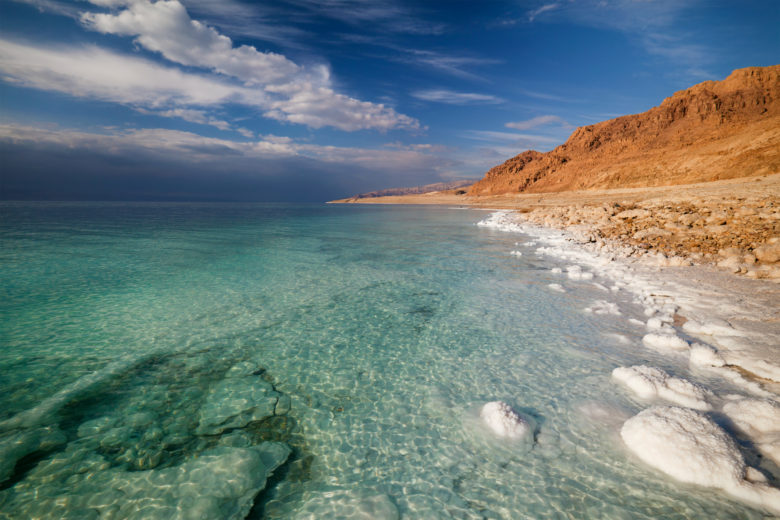
About 400 meters below sea level on the edge of Israel’s Judean Desert, you’ll find the Dead Sea. Water evaporates from the Dead Sea faster than new water flows into it. The result of this natural marvel is the greatest salt-to-water concentration in the world and a high concentration of healthful minerals.
The extreme salinity prevents the existence of any living creature aside from some microscopic bacteria; hence the Dead Sea’s rather ominous moniker. But thanks to recent conservation efforts, international tourism and entrepreneurship, the Dead Sea is very much alive. It is attracting the attention of culinary enthusiasts and food entrepreneurs who see untapped potential in this richly salinated body of water.
Bath salts and mud harvested from the Dead Sea have been prized commodities since the time of King David. A foundational source of health and wellness for millennia, the sea is a popular spa travel destination for those seeking the beneficial effects of sand, sunshine, mud and salt water. The salt composition and concentration of more than 21 known minerals have been found to possibly alleviate symptoms of dermatological conditions such as psoriasis and eczema as well as provide relief from arthritis and rheumatic and degenerative joint diseases.
With important minerals including calcium, iron, potassium, manganese and zinc as well as lower sodium content than most commercially available table salt, Dead Sea salt is unlike any other on earth. However, the salt is high in bromide, a naturally occurring element that dissolves in water and can be toxic. The high bromide content once rendered Dead Sea salt itself virtually inedible. Fortunately, modern technology has allowed harvesters to mitigate the salt’s toxicity. To harvest salt from the Dead Sea, briny water is extracted into evaporation pools, which transform over about eight months into crystals of rock salt. The bromide is separated from salt crystals during the harvesting process. The salt crystals are then washed, milled, refined and made available for sale.
A small Palestinian company, West Bank Salt Works, has been harvesting table salt from the North Dead Sea since 1967, using a potash processing plant that had been partially destroyed during the Six-Day War. The factory manager, whose son now runs West Bank Salt Works, was granted permission by the potash company to operate the restored facility as a salt extraction business providing high-quality table salt for export to the West Bank, Gaza and Jordan.
Israeli environmental activist and entrepreneur Ari Fruchter discovered West Bank Salt Works a couple of years ago when filming a documentary about the area. He forged a partnership with West Bank Salt Works for his new Naked Sea Salt line of culinary salts.
As a model social enterprise and example of Israeli and Palestinian economic cooperation and interdependence, Fruchter hopes his venture will raise awareness about the historic, cultural and environmental significance of the Dead Sea and help the salt find a new life in kitchens and atop tables everywhere.


